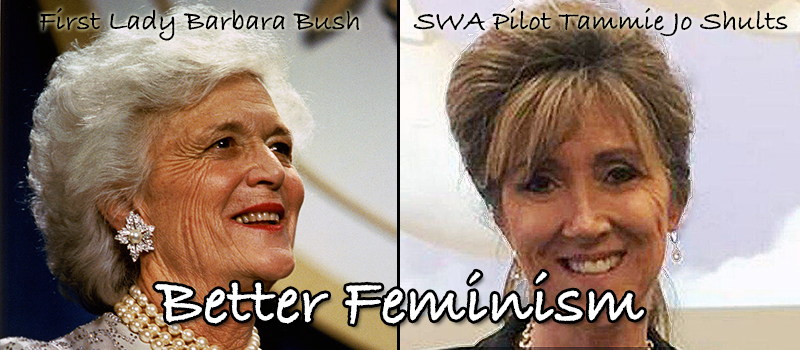Penna Dexter
Many tributes to Former First Lady (and First Mom) Barbara Bush describe her 1990 Wellesley graduation speech, which placed her, at least according to the Washington Post, “at the center of a national debate about the nature of feminism that would continue for decades.”
Feminists claim their movement is about making choices, but 150 Wellesley students protested that Mrs. Bush had “gained recognition through the achievements of her husband.” Not quite the Wellesley way.
In the end, she wowed the crowd, telling them that “you are a human being first and those human connections — with spouses, with children, with friends — are the most important investments you will ever make.”
In a recent National Review article, Heather Wilhelm contrasts what she calls “Today’s Sad Feminism” with the values exhibited in Barbara Bush’s life. She writes that as Mrs. Bush “rose above ‘society’s dream’,” so did Tammie Jo Shults, the Southwest Airlines pilot who, just last week, guided a crippled plane to a safe landing after the midair explosion of one of its engines.
Heather Wilhelm points out that Captain Shults, age 56, learned to fly in the Navy at a time when “the idea of women flying fighter jets often earned dismissive scoffs.”
Growing up near an Air Force base, “she watched jets in action and fell in love.”
Ms. Wilhelm says modern feminism tells women “there is one way to think — to the left” and the Barbara Bush-like “dream of being a full-time mother and devoting time to family is often brushed aside as less worthy than the aspiration to be a scientist, or an engineer or a CEO.”
A better feminism would applaud women who find ways to make life better for those whom God places in their orbit.
This feminism would empower a woman — perhaps a pilot, perhaps a First Lady — who carries out, with calm and grace and often with “nerves of steel”, the roles life tosses her way.
 Listen Online
Listen Online Watch Online
Watch Online Find a Station in Your Area
Find a Station in Your Area











 Listen Now
Listen Now Watch Online
Watch Online
